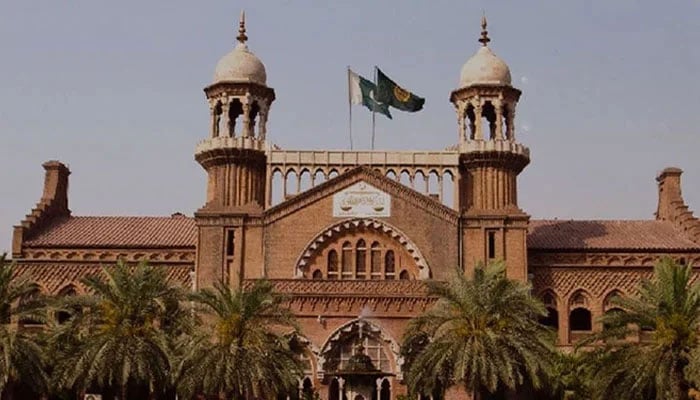Punjab enforces law for swift, cheap justice across province
Earlier this law was enforced only to the extent of Lahore
LAHORE: The Punjab government has implemented the Alternate Dispute Resolution (ADR) Act 2019 for the first time in history to ensure swift and cheap justice across the province. Earlier this law was enforced only to the extent of Lahore.
According to the documents obtained by the reporter, implementation of the Punjab Alternative Dispute Resolution Act, 2019 aims at speedy justice in cases pending in both civil and criminal courts. After enactment of the Act, civil courts would, with the consent of the parties, refer the cases to persons selected for Alternative Dispute Resolution (ADR) within 30 days of submission of the written statement. Other civil cases including rent, property disputes, family matters and commercial contracts could be referred to such persons for dispute resolution. The ADR persons may include lawyers, doctors, engineers and other professionals, apart from political and social personalities.
The ADR persons may include the parties themselves, their counsel, approved dispute resolution service providers or ADR centres, law firms or institutions, etc.
Cases registered by the police, defined under Section 345(1) of the Code of Criminal Procedure (CrPC), would be sent to the ADR with the consent of complainant, before framing of charges or within seven days of cases registration. Under Section 345(2) of the CrPC, cases could be referred to the ADR at any time after framing of charges, with the consent of the public prosecutor and the parties concerned.
The persons selected for resolution of disputes would have to complete processing of cases in 60 days, though time period can be extended up to 120 days with the consent of the court. During the dispute resolution proceedings, trial would remain suspended, but the courts may record evidence if unavoidable. The courts would have discretion and power to refer cases at any stage, with the consent of the parties concerned to persons selected for dispute resolution. The parties may choose an individual for dispute resolution by mutual agreement; otherwise, the court would appoint an individual while the costs and fees would be mutually determined by the parties. Upon successful completion of dispute resolution, the courts would give a judgment and issue an order, which would not be subject to review or appeal. The Punjab government is considering setting up an accreditation authority to oversee dispute resolution service providers and centres across the province, which would be headed by a retired judge of the Lahore High Court. This authority would register the selected persons for resolution of disputes. The initiative would not only significantly reduce the number of pending cases in courts but also help people get swift and cheap justice.
-
 Everything We Know About Jessie J's Breast Cancer Journey
Everything We Know About Jessie J's Breast Cancer Journey -
 Winter Olympics 2026: What To Watch In Men’s Hockey Today
Winter Olympics 2026: What To Watch In Men’s Hockey Today -
 Winnie Harlow Breaks Vitiligo Stereotypes: 'I'm Not A Sufferer'
Winnie Harlow Breaks Vitiligo Stereotypes: 'I'm Not A Sufferer' -
 Apple Martin Opens Up About Getting 'crazy' Lip Filler
Apple Martin Opens Up About Getting 'crazy' Lip Filler -
 Why Did OpenAI Remove One Crucial Word From Its Mission Statement?
Why Did OpenAI Remove One Crucial Word From Its Mission Statement? -
 Prince William Warned His Future Reign Will Be Affected By Andrew Scandal
Prince William Warned His Future Reign Will Be Affected By Andrew Scandal -
 Amy Madigan Reflects On Husband Ed Harris' Support After Oscar Nomination
Amy Madigan Reflects On Husband Ed Harris' Support After Oscar Nomination -
 Is Studying Medicine Useless? Elon Musk’s Claim That AI Will Outperform Surgeons Sparks Debate
Is Studying Medicine Useless? Elon Musk’s Claim That AI Will Outperform Surgeons Sparks Debate -
 Margot Robbie Gushes Over 'Wuthering Heights' Director: 'I'd Follow Her Anywhere'
Margot Robbie Gushes Over 'Wuthering Heights' Director: 'I'd Follow Her Anywhere' -
 'The Muppet Show' Star Miss Piggy Gives Fans THIS Advice
'The Muppet Show' Star Miss Piggy Gives Fans THIS Advice -
 Sarah Ferguson Concerned For Princess Eugenie, Beatrice Amid Epstein Scandal
Sarah Ferguson Concerned For Princess Eugenie, Beatrice Amid Epstein Scandal -
 Uber Enters Seven New European Markets In Major Food-delivery Expansion
Uber Enters Seven New European Markets In Major Food-delivery Expansion -
 Hollywood Fights Back Against Super-realistic AI Video Tool
Hollywood Fights Back Against Super-realistic AI Video Tool -
 Meghan Markle's Father Shares Fresh Health Update
Meghan Markle's Father Shares Fresh Health Update -
 Pentagon Threatens To Cut Ties With Anthropic Over AI Safeguards Dispute
Pentagon Threatens To Cut Ties With Anthropic Over AI Safeguards Dispute -
 Samsung Galaxy Unpacked 2026: What To Expect On February 25
Samsung Galaxy Unpacked 2026: What To Expect On February 25




